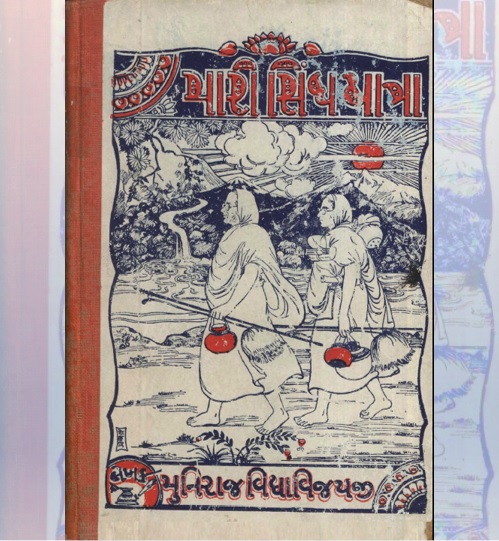
Today’s world is highly suspicious. People do not hesitate to doubt you even in small matters
[Editor’s Note: This is Part 08 (Eight) of a series of articles based on a pre-partition book named “મારી સિંધ યાત્રા” (“منهنجو سنڌ جو سفر”) in Gujarati authored by Jain sadhu Shri Vidyavijayji, narrating his experiences of travel and stay in Karachi for about 2 and a half years between 1937 and 1939. It would be advisable to click on Introductory Article and read it for a better understanding of the series. – Nasir Aijaz, Editor Sindh Courier]
Vimal Shah, Mumbai
The Suspicious World
“We came to know about one more thing at that time. It was not that there would be only us (Sadhus) alone on this journey. A group of householder gentlemen were also to accompany us. A group of volunteers from the Karachi Sangh were to escort us. So obviously, you need better arrangements for more people. While walking barefoot we had to halt at every station on the way – whether small or big. In some places, the householders may or may not get proper arrangements. We were to encounter people of different natures. Today’s world is highly suspicious. People do not hesitate to doubt you even in small matters. And some people are so flared up seeing Sadhus that even a literate person would hesitate to give you shelter. (That’s because – a) C.I.D.s also go around in the disguise of a Sadhu and thieves-dacoits also go around in the disguise of a Sadhu, traitors also wander in the disguise of a Sadhu and insurgents also hide in the disguise of a Sadhu. In such a situation, people do not trust even gentlemen in the absence of any kind of acquaintance. The station masters are literate and sensible but still, they are employees after all. They even need to bother about their superior officers and their employment. Therefore, I thought it necessary to make adequate arrangements such that our group does not become a burden on anyone or a victim of mistrust by anyone.”
The Resources
“This happened about thirty or thirty-two years ago. When we were travelling in Bengal along with Gurudev Shri Vijay Dharmasoori Maharaj, we gained a lot of experience of how difficult it is to travel in unknown places without certain resources. And when a group of volunteers was also to accompany us, it was necessary to arrange as many resources as possible for their comfort as well. We knew that availability of water is very difficult in the Jodhpur line. Only one train passes through the route in a day with a tank full of water and people at all the stations must replenish their stock of water for the day, and so on each day. In the meantime, if they run out of water for some reason, they must struggle for the day. Travelling through such a situation, I thought the more the resources the better the convenience.”
Some people are so flared up seeing Sadhus that even a literate person would hesitate to give you shelter. That’s because C.I.D. people, thieves-dacoits, traitors and insurgents also hide in the disguise of a Sadhu
“The journey to Sindh was not a long distance as far as we are concerned. The journey of 500 miles was not much for the people travelling one and a half to two thousand miles conjointly. Despite the journey being not so long, the discomfort of – the villages on the way, proper alms-houses, water, accommodation, nature of the people of that region, etc. etc. was in sight. It was necessary to make arrangements for as much comfort and ease as possible.”
The Government Support
“I am pleased to inform that the ‘Government of India’ and the Jodhpur State had extended the best possible facilities. The assistant political secretary of the ‘Government of India’, Major Gaisford had issued a General Recommendation, which we could use anywhere and with any officer.”
Following is the General Recommendation Letter:
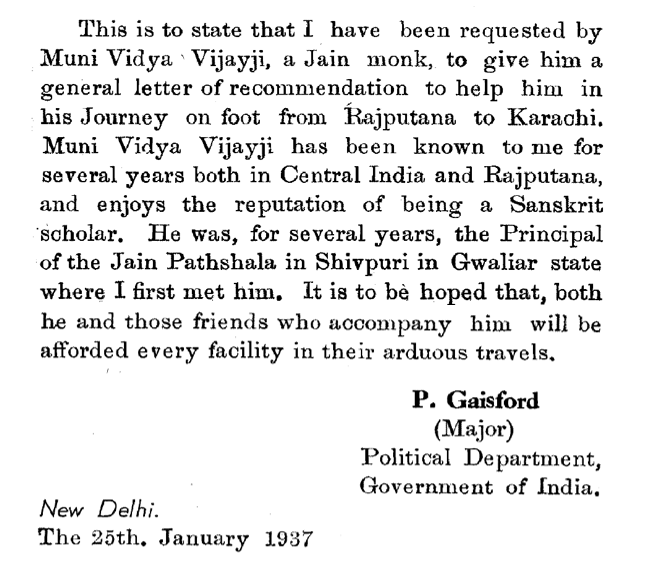
Similarly, the Jodhpur State facilitated our group by issuing three circulars. One set of instructions was sent out by the Honorable Chief Minister to all the Hakims (Pargana Officers) within the state boundaries. Another set of instructions was sent out by the Chief Traffic Manager of the Jodhpur Railway, to all the Station Masters from Balotra to Mirani station near Hyderabad. And the third set of instructions was sent out by the Police Superintendent to all the police stations. These instructions directed them to extend all the possible facilities to our group.
Following is the order issued by the Honorable Chief Minister:
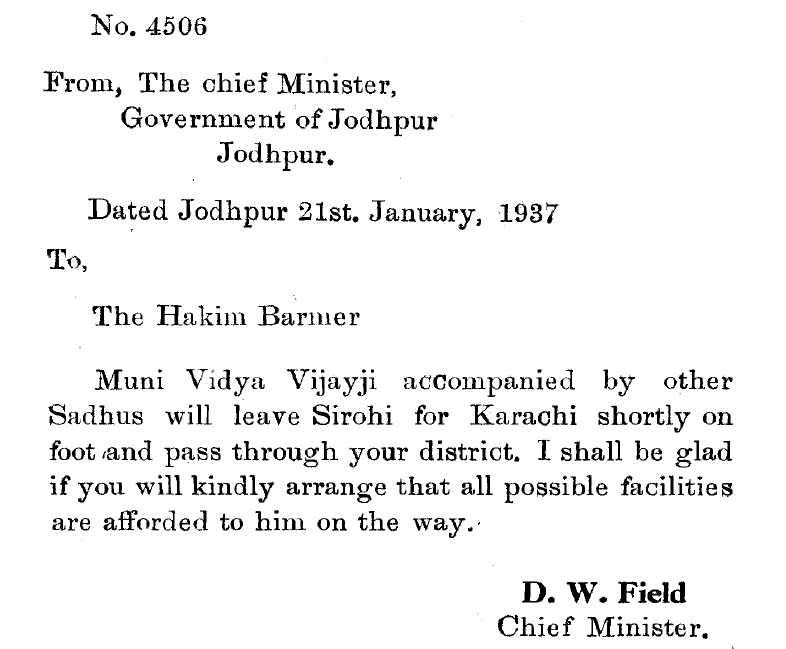
Following are the instructions sent out by the Chief Traffic Manager of the Jodhpur Railway to all the Station Masters:
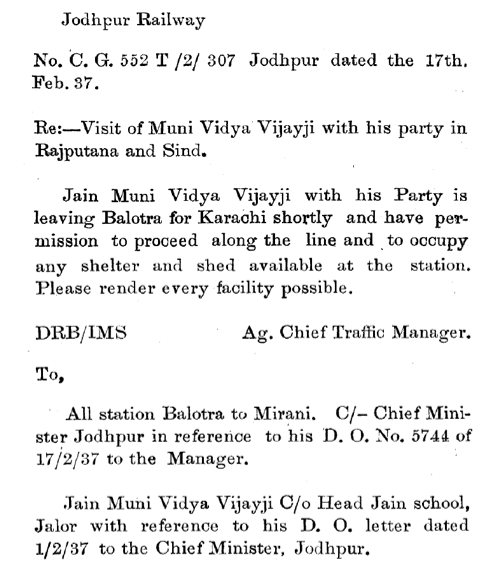
With the help of the above resources obtained from both governments, our group had a lot of conveniences. We used to get shelter at all the stations on the way – whether small or big, and the householders could arrange water, etc. also very easily. Because of the orders of the Jodhpur state, three camel riders – two from the Tehsil and one from the Police escorted us right up to the borders of Jodhpur. Apart from this, whatever facilities we needed were available quickly. Most of the station masters in the Jodhpur Railway were Brahman or Kayastha of the Jodhpur state itself. They themselves being gentlemen, were pleased to see ascetic sadhus travelling to such a difficult region and were eager to extend all their help.”
Arrangements by the Karachi Sangh
“Teams of five or ten volunteers from the Karachi Sangh used to keep visiting us frequently. They had distributed the responsibilities of escorting us from one place to another. The arrangements of Karachi Sangh had started right from Balotra. Bhai Narbheram Nemchand and Bhai Jatashankar Popatlal had assumed the lead role in making all the arrangements. Bhai Jatashankar Popatlal and Bhai Manilal Gulabchand Mehta were prominent leaders among the escorting teams. We were on our journey with such arrangements, resources, and cooperation.” (Continues)
Click here for Part-I, Part-II, Part-III, Part-IV, Part-V , Part-VI , Part-VII
__________________
About the contributor of the series of Articles based on the book
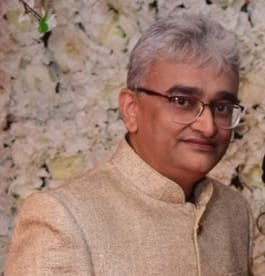 Vimal Shah is a follower of Jainism by birth and is based in Mumbai, India. He is a Computer Engineer and holds a Diploma in Jainology from Mumbai University. He has immense interest in reading, writing, studying, and teaching Jain Philosophical subjects. He conducts classroom as well as on-line sessions on Jain Philosophical courses. He has created several power point presentations with animation which he uses while teaching and has participated in several Jain Community events to present and explain the relevant subjects to the visiting audience. He has significantly contributed to the translation, reviewing, and editing of the set of books ‘Compendium of Jainism’ of JAINA, USA from English to Gujarati – an initiative of the JAINA India Foundation. He is also associated with a Project for the translation of Jain Aagams (Scriptures) from Gujarati to English and continues to study various subjects and remains a student of Jain Philosophy. He has a special interest in the history and preservation of the Jain Heritage in Pakistan, and is associated with the Jain Heritage Foundation, New Delhi.
Vimal Shah is a follower of Jainism by birth and is based in Mumbai, India. He is a Computer Engineer and holds a Diploma in Jainology from Mumbai University. He has immense interest in reading, writing, studying, and teaching Jain Philosophical subjects. He conducts classroom as well as on-line sessions on Jain Philosophical courses. He has created several power point presentations with animation which he uses while teaching and has participated in several Jain Community events to present and explain the relevant subjects to the visiting audience. He has significantly contributed to the translation, reviewing, and editing of the set of books ‘Compendium of Jainism’ of JAINA, USA from English to Gujarati – an initiative of the JAINA India Foundation. He is also associated with a Project for the translation of Jain Aagams (Scriptures) from Gujarati to English and continues to study various subjects and remains a student of Jain Philosophy. He has a special interest in the history and preservation of the Jain Heritage in Pakistan, and is associated with the Jain Heritage Foundation, New Delhi.